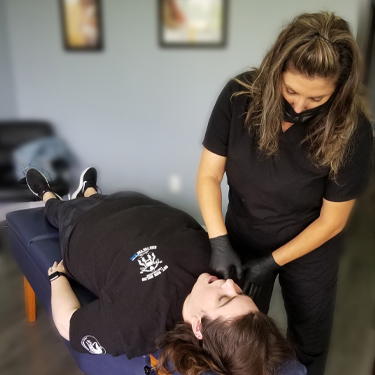TMJ in Los Angeles CA
 TMJ stands for the temporomandibular joint. It’s an important joint formed by your skull and your jaw bone and involves the muscles needed for chewing. Your TMJ acts like a sliding hinge, and connects your jawbone to your skull. It is responsible for opening and closing your mouth, allowing the jaw to move smoothly up and down and side to side, and enables you to talk, chew, and yawn. A common mistake people make is referring to TMJ pain simply as TMJ. When you experience pain in this area, your chiropractor or dentist may refer to it as a temporomandibular disorder, or TMD.
TMJ stands for the temporomandibular joint. It’s an important joint formed by your skull and your jaw bone and involves the muscles needed for chewing. Your TMJ acts like a sliding hinge, and connects your jawbone to your skull. It is responsible for opening and closing your mouth, allowing the jaw to move smoothly up and down and side to side, and enables you to talk, chew, and yawn. A common mistake people make is referring to TMJ pain simply as TMJ. When you experience pain in this area, your chiropractor or dentist may refer to it as a temporomandibular disorder, or TMD.
What causes TMJ syndrome in Simi Valley?
Medical professionals do no completely understand the causes of TMJ/TMD. Multiple factors contribute to the muscle tightness and dysfunction that characterize this condition. It is not clear whether some of these causes directly lead to TMJ syndrome or if they are a result of the disorder. Causes may include
- misalignment (malocclusion) of or trauma to the teeth or jaw,
- teeth grinding (bruxism)
- poor posture,
- stress or anxiety
- arthritis and other inflammatory musculoskeletal disorders,
- orthodontic braces
- excessive gum chewing
There are several risk factors for TMJ/TMD:
- Poor posture in the neck and upper back muscles may lead to neck strain and abnormalities of jaw muscle function.
- Stress may increase muscle tension and jaw clenching.
- Women 18-44 years of age have increased risk.
- Patients with other chronic inflammatory arthritis have increased risk.
- People with jaw trauma or poorly positioned teeth have increased risk.
- People who have a genetic predisposition to pain sensitivity and increased stress responses may be more susceptible.
What are TMJ syndrome symptoms and signs?
The main TMJ/TMD symptom is pain in the jaw joint. This joint is located just in front of the ear, and pain associated with TMJ/TMD may involve the face, eye, forehead, ear, or neck. Signs and symptoms of temporomandibular joint dysfunction include the following:
- Pain or tenderness in the jaw, especially at the area of the joint
- Popping/clicking of the jaw (crepitus)
- Pain that feels like a toothache
- Ear pain (earache) or sounds of cracking in the ears
- Ringing or popping sounds in the ears (tinnitus) or a sense of fullness in the ears
- Headaches, including migraines
- Blurred vision
- Tight, stiff, or sore jaw or neck muscles
- Muscle spasms in the jaw
- Facial pain, mouth pain, jaw pain, cheek pain, or chin numbness or tingling
- Pain at the base of the tongue
- Pain, swelling, or a lump in the temple area
- Difficulty chewing
- Shoulder pain
- Locking or dislocation of the jaw (usually after widely yawning), referred to as lockjaw
- Dizziness or vertigo
Complications of long-term TMJ syndrome include chronic face pain or chronic headaches. In severe situations, where pain is chronic, or associated with other inflammatory disorders, longterm treatment may be necessary.
Is it possible to prevent TMJ syndrome?
Symptoms of TMJ syndrome tend to be episodic and related to stress and lifestyle.
Prevention of TMJ syndrome symptoms can often be achieved using self-care at home, such as
- eating soft foods;
- avoiding chewing gum
- maintaining proper posture
- practicing stress reduction and relaxation techniques
- using dental splint appliances as recommended by a jaw care professional
- using proper safety equipment to prevent jaw fractures and dislocations while exercising, working, or participating in sports.






